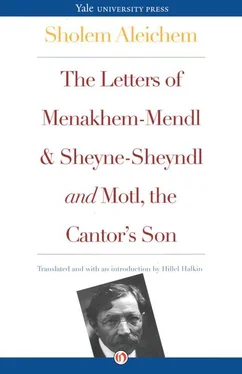“Well, cantor! How has Shavuos been treating you?”
“Praise God.” My father smiles like a corpse.
“Aha! You’ve been coughing less? You slept well?” The doctor bends close to him.
“Not at all …,” my father answers, stopping to catch his breath after every few words. “I’ve been coughing more and sleeping less …but God be praised …it’s Shavuos …the day the Torah was given …and we have a guest …a guest for the holiday …”
Everyone looks at the guest. The guest stares at the floor. His thoughts are somewhere else. He’s thinking of logs, bramble swords, puffballs that burst like bombs, a calf that has become a dumb critter, the river at the bottom of the hill. He’s thinking of the high, bright, deep, blue skullcap of the sky.
LUCKY ME — I’M AN ORPHAN!
I’ve never been so important. How is that? Because my father, Peysi the cantor, died on the first day of Shavuos. That makes me an orphan.
My brother Elye and I have to say the kaddish. Elye taught me to say it. He’s a good brother and a rotten teacher. He whacks me each time he gets mad. He sat me down, opened a prayer book, and had me read:
Yisgodol veyiskodosh shmey rabbo …
Elye said I had to learn it by heart. He read it with me a few times and told me to practice. I tried but couldn’t get the hang of it.
Everything went fine up to veyatzmokh purkeney. I kept getting stuck on those two words. Elye poked me with an elbow and said that either I was dreaming (I was) or thinking of the calf (I was). He’s no slouch, my brother Elye. He made me say the kaddish over and over. In the end I got as far as le’eylo ule’eylo min kol birkhoso veshiroso and couldn’t go a line further. Elye grabbed me by the ear and said Papa should only rise from his grave and see the son he had.
“I wish I could skip the kaddish.”
So I said to Elye and got a good box on the ear. My mother came running.
“For the love of God! What do you think you’re doing? Have you forgotten the boy is an orphan?”
My mother and I sleep together in my father’s bed, which is the only furniture left. She lets me have most of the blanket.
“Cover yourself and sleep, my orphan,” she says. “I only wish there was something to eat.”
I cover myself and don’t sleep. I practice the kaddish. It’s the one thing I have to learn, because I’ve stopped going to school and am no longer in Hirsh-Ber’s choir. Orphans are excused.
Lucky me!
Congratulations! I know the whole kaddish by heart. You should hear me rattle it off in synagogue. Like a house on fire! I have a terrific voice too, a soprano I got from my father. All the boys are jealous. The women cry. Rich Jews like Yosi give me a kopeck after prayers. But Yosi’s son, bug-eyed Henekh, is out to get me. He sticks his tongue out whenever I say the kaddish. He’s dying to make me laugh. I keep a straight face just to spite him. Once Aron the beadle saw him and chucked him out by the ear. That’s what I call a good deed!
Now that I say the kaddish every morning and evening, I don’t have to carry Dobtshe around. I’m free as a lark to spend all day by the river, swimming and fishing.
Fishing is something I taught myself to do. I could teach you too if you wanted. You take off your shirt and knot the sleeves and wade into the water up to your neck. You have to wade pretty far. When your shirt is full of mud and weeds, you hustle out and give it a shake to see what’s in it. If there are any tadpoles flipping about, you throw them back — that’s plain human kindness. Sometimes there’s a leech. Leeches are good money. They fetch three and a half kopecks a dozen. That isn’t hay.
You can forget about fish, though. There used to be fish but no more. I haven’t caught a single one. Leeches are good enough for me. But sometimes there are no leeches either. This summer I’m still looking for my first. Just don’t ask me how Elye found out I’d gone fishing. He nearly tore my ears off. It’s a good thing Pesye saw him. She watches out for me like a mother.
“How can you pick on an orphan like that?”
Elye was so ashamed he let go of my ear. There’s nothing folks won’t do for me. Lucky me — I’m an orphan!
Pesye is in love with me. She keeps asking my mother if she can have me. “What do you care?” she says. “I already have twelve mouths to feed. So there’ll be a thirteenth.
She had almost talked my mother into it when Elye butted in:
“Who’ll see to it that he says the kaddish?”
“I will, all right? I hope that’s good enough for you.”
Pesye’s no rich lady. Her husband is a bookbinder named Moyshe. They say he’s pretty good at it. But being good isn’t enough; you need luck too. That’s what Pesye tells my mother. My mother disagrees. She says you can be lucky without luck. Look at me. I’m an orphan and everyone wants me. They’re actually fighting over me. My mother says they can kill themselves first. She cries and asks Elye:
“What do you think? Should we let him stay with Pesye for a while?”
Elye is nearly a grown-up. That’s why she asks him. He strokes his smooth face as if it had a beard and talks grown-up talk.
“By all means! Anything to keep him from growing up a bum.”
That means I can live with Pesye if I promise not to be a bum. There’s nothing being a bum doesn’t include. Tie paper to the cat’s tail and you’re a bum. Bang a stick on the priest’s gate to make his dogs come running and you’re a bum. Unplug Leibl the water carrier’s barrel so that all the water runs out and you’re a bum.
“It’s your luck you’re an orphan,” Leibl says. “Believe me, I’d break every bone in your body if you weren’t.”
I believe him. He’d never lay hands on an orphan.
Lucky me.
You’ll pardon my saying so, but our neighbor Pesye told a fat lie. She said she had twelve mouths to feed. But by my count, I’m the fourteenth. She must have forgotten blind Uncle Borukh. Or else she left him out because he has no teeth. That doesn’t stop him from eating, though. He stuffs his mouth with food and swallows it like a goose. Everyone stuffs themselves at Pesye’s. It’s unnatural how much they eat. I stuff myself too. But I’m the only one to get kicked beneath the table for doing it. The worst kicks come from Bumpy. He’s a maniac, Bumpy is. His real name is Hirshl but he’s called Bumpy because of the bump on his forehead. Everyone at Pesye’s has a name. There’s Log, and there’s Tomcat, and there’s Ox, and there’s Ratface, and there’s Petelulu, and there’s Give-Me-More, and there’s Butternose.
Don’t rack your brains over it. I’ll explain each one to you. Log is Log because he’s heavy and round. Velvl is black and hairy as a cat. Hayyim looks like an ox, so that’s his name. Mendl is Ratface on account of his pointy nose. Faytl doesn’t talk so well: that makes him Petelulu. Berl is always eating; give him bread with chicken fat and he wants more. Zerakh is Butternose because of a disgusting habit that’s not his fault. You can thank his mother for never teaching him to use a handkerchief. But maybe she’s not to blame either. Let’s not fight over it.
It’s a house full of names. Even the poor cat, who did nothing to deserve it, is called Feyge-Leah the Beadle’s Wife. That’s because Feyge-Leah’s a big woman and the cat’s a big cat. I don’t know how many lickings Pesye’s boys have gotten for calling that cat by a woman’s name. Go throw beans at the wall! Everyone has a name and that’s that.
I’ve been given a name too. Don’t try to guess what it is. It’s Lips. No one, it seems, likes my lips. They say I use them too much when I eat. I’d like to see someone eat without them! Although I’m not the type to take offense, it’s a name I hate. That’s why they tease me with it. I’ve never seen such wise alecs in my life. First they called me Motl-Much-Lips. Then they shortened it to Much-Lips. Now it’s plain Lips.
Читать дальше












